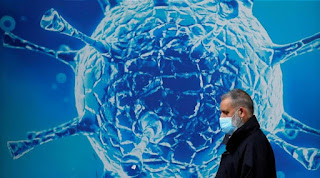Author : Dr. P D Gupta
Former Director Grade Scientist, Centre for Cellular and Molecular Biology, Hyderabad (INDIA), Email: pdg2000@hotmail.com, Cell: 080728 91356
www.daylife.page
A new variant of the coronavirus - Omicron – is knocking your door bells. Prepare yourself to win the war with your powerful enemy. The latest COVID-19 variant identified in South Africa has been given the Greek name 'Omicron', and labelled as a “variant of concern” by UN health agency experts due to its large number of mutations and possible faster rate of infection. Following the tradition of giving variants a Greek letter name the first one is called as delta the second one is called mu WHO officials chose to skip the next letters available for variants, nu and xi since these are common surnames among Chinese people, so they used the next alphabet “omicron”
 |
| Photo : Courtesy |
South African scientists confirmed that there had detected a variant with a high number of mutations that could make it more transmissible and adept at evading the body’s immune defences. As long as the coronavirus spreads through the population, mutations will continue to happen, and the delta variant family continues to evolve. “New variants of the SARS-CoV-2 virus are detected every week. Some of those are harmless and others are very potent enemies.
On 26 November 2021 WHO urged all countries to adopt a risk-based and scientific approach to travel bans linked to the new variant identified in South Africa and Botswana. According to South African health authorities so far, fewer than 100 cases of the new variant have been confirmed,
Several countries, including the United States, have since restricted travel from southern Africa while epidemiologists race to learn more. Cases have been identified in nearly a dozen nations, most but not all tied to recent travel to Africa. Experts say, “It’s going to take a really high bar for something to take over for delta, and we don’t know whether this is going to do it.
Cases have also been identified in Australia, Britain, Belgium, Botswana, the Czech Republic, Denmark, Germany, Hong Kong, Israel, Italy and Hong Kong. Dutch health authorities said Saturday that testing of about 600 passengers who arrived from South Africa found 61 infected with the virus, including 13 cases attributable to the omicron variant.
There are more than 30 mutations in the spike protein, the part of the virus that binds to human cells, allowing it to gain entry.
Scientists are worried those mutations could make omicron more transmissible and potentially equipped to defy immune defenses, making vaccines less effective. The WHO said Friday that preliminary evidence suggests an “increased risk of reinfection” compared with other variants.
Professor Linda Bauld, at the University of Edinburgh, said there were “genuine” causes for concern given that “it does look like a more transmissible variant.” But she added: “I think it’s premature to panic. … There’s just a lot we don’t know at the moment.”
 |
| Photo : Courtesy |
Public health experts say there is a high probability that the new variant is already spreading in a number of countries beyond those where cases have been detected, noting that the first infection in Hong Kong involves a passenger who landed on Nov. 11.
There are several other troubling signs. One of the first cases identified in Belgium, for example, involves a young woman who did not travel to sub-Saharan Africa. Health officials there said she developed symptoms 11 days after traveling to Egypt via Turkey. She had not been vaccinated and had not developed signs of severe disease.
Anthony S. Fauci, the US leading infectious-disease expert, told ABC News’s that the variant’s arrival in the United States is essentially unavoidable.
“When you have a virus that has already gone to multiple countries, inevitably, it will be here. The question is: Will we be prepared for it?” Fauci said Sunday.
Will Vaccines be effective against omicron?
Probably will not completely subvert the protections that vaccines provide, experts say.
“Regardless of whether or not this new variant ends up spreading, I would suggest that people do what they can to minimize their chances of getting infected with SARS-CoV-2,” Bloom added, referring to the virus by its technical name. There are certain obvious things you can do: Get vaccinated, get a booster vaccination, wear a mask.
However, Bauld added, transmission of the coronavirus probably will not be eliminated even with a vaccine, as seen with the delta variant, with mutations ultimately able to “occur in any country.”
Check the spread of omicron
Close the borders to “foreigners from all countries.” impose new quarantine rules for those arriving from the region. All international travellers to take a PCR test within two days of arrival and quarantine until their test returns a negative result. Get vaccinated and get booster shots.
However some experts have a view that a travel ban could delay the arrival of an infectious disease in a country by days or weeks. However, little evidence suggested it eliminated the risk of the virus jumping borders in the long term.
“Making a general conclusion would probably be a mistake at this point,” said Alex Sigal, a faculty member at the Africa Health Research Institute, told The Post. “But let’s say it doesn’t look hugely different from anything we’ve seen before.
He added: There’s no indication right now it’s going to do something completely different.
No case of the Omicron variant of coronavirus has been detected in India, however, in Karnataka among two recent South Africa returnees the sample of one of the appears "different from the Delta variant". (The author has his own study and his own views)





